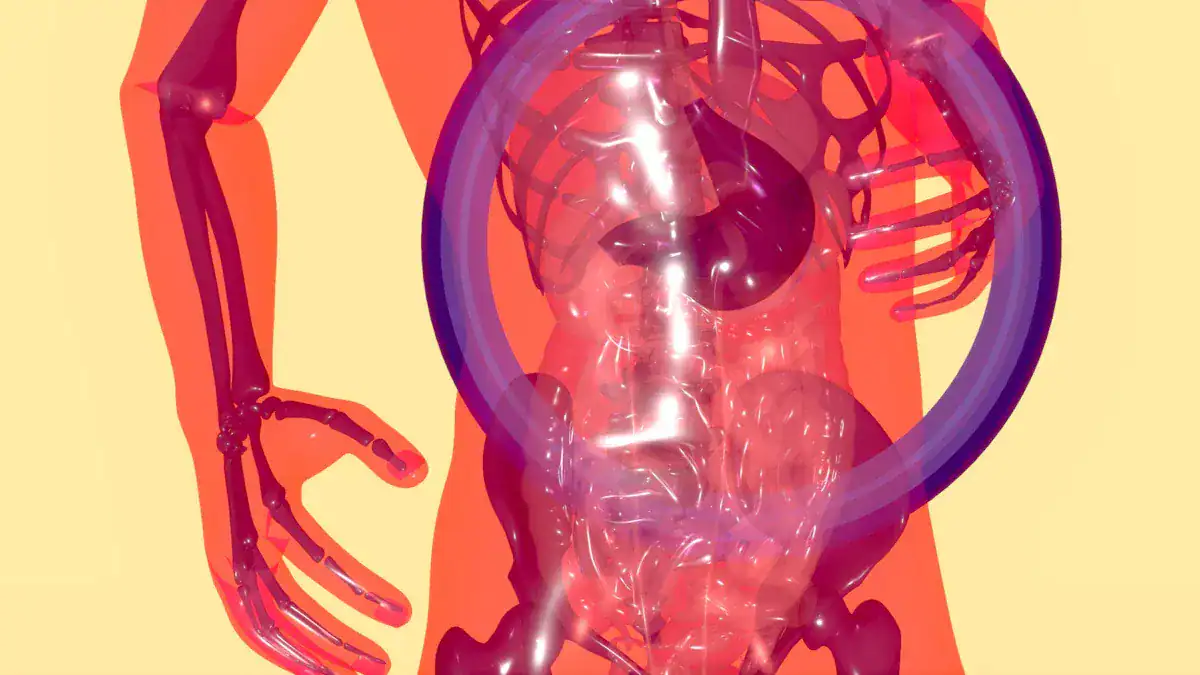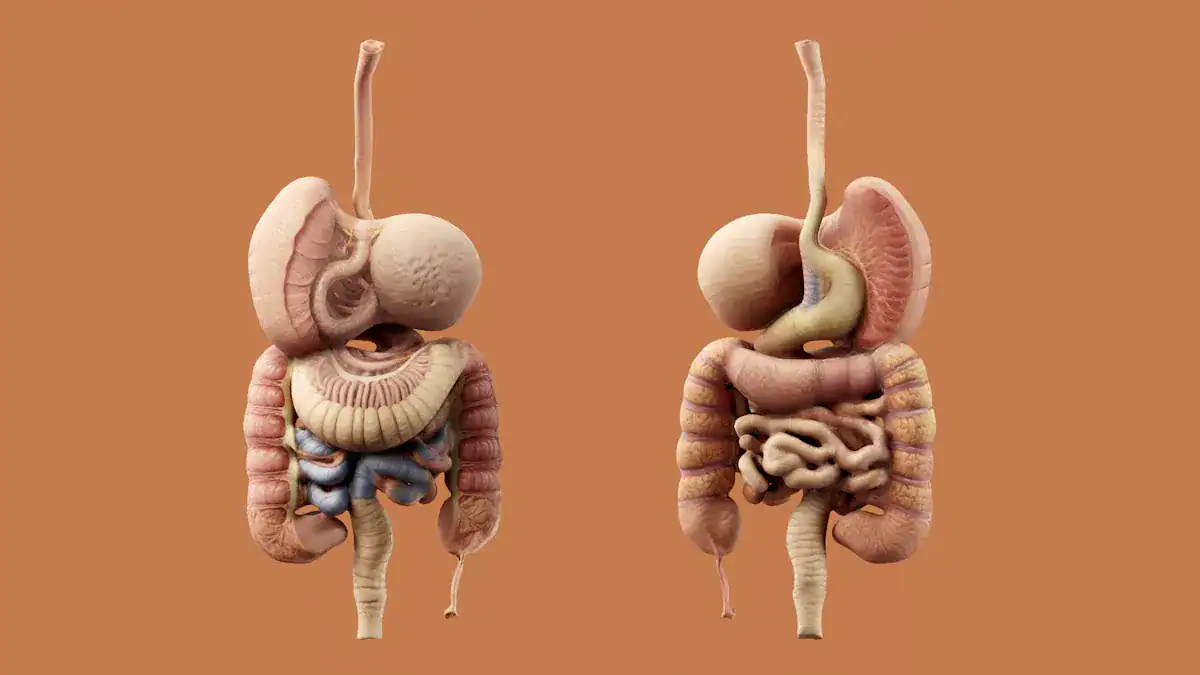
You often hear sounds from your belly. These are gurgling intestines, also known as borborygmi. Your digestive system makes these characteristic abdominal noises. They are usually normal. Food, liquids, digestive juices, and air move through your system, causing this stomach growling.
This churning is a sign of healthy digestion. You might notice your stomach churning more. This constant churning is part of your body’s work. You sometimes feel your stomach churning, a familiar internal churning.
Learn their causes and how to manage them. This helps you know when these sounds might indicate a more serious health issue or symptoms needing medical attention for your digestive health. Your stomach gurgling can tell you a lot.
Key Takeaways
Gurgling intestines are normal sounds from your digestive system. They show your gut is working to digest food and liquids.
Many things cause stomach gurgling. These include hunger, eating too fast, certain foods, and stress. Digestive issues like IBS can also cause these sounds.
You can reduce gurgling by changing your diet. Eat slowly, drink enough water, and manage stress. Probiotics can also help your gut.
See a doctor if gurgling comes with pain, big changes in bowel habits, or unexplained weight loss. Fever, vomiting, or blood in your stool also mean you should get medical help.
Why Your Stomach Growls

You hear your stomach growling for many reasons. Some are perfectly normal. Others might point to specific conditions. Understanding these causes helps you know your body better.
Normal Digestion
Your digestive system is always at work. This work often creates sounds. These sounds are a normal part of digestion. They happen as food, liquids, digestive juices, and air move through your intestines.
This movement is called peristalsis. It involves wave-like contractions and relaxations of your intestinal walls. These actions mix and squeeze everything along. Enzyme-rich fluids in your gastrointestinal tract also help break down what you eat and drink. This constant churning and mixing create the sounds you hear. These are the normal causes of stomach churning.
Hunger Signals
You often hear your stomach growling when you are hungry. Your body sends signals to your intestines and stomach. These signals activate your desire to eat. They cause muscle contractions and sounds.
A hormone called motilin plays a big role here. Your body releases motilin from cells in your gut lining. It causes strong contractions in your stomach. Motilin can also activate the vagus nerve. This nerve helps control digestion. This activation can make you feel hungry. It promotes the sensation of hunger. This is why your stomach growling often means you need to eat.
Eating Too Fast
Eating too quickly can also make your stomach churning more noticeable. When you eat fast, you swallow more air. This extra air mixes with food and liquids in your digestive system. This creates more gas.
More gas means more movement and more sounds as your body tries to process everything. This can lead to increased abdominal noises.
Food and Drink Triggers
Certain foods and drinks can make your stomach gurgling louder. Some food components are hard for your body to absorb. These include fermentable oligosaccharides, disaccharides, monosaccharides, and polyols (FODMAPs). These short-chain carbohydrates pass into your bowel.
They increase water content there. They also cause gas production as gut bacteria ferment them. This extra water and gas lead to abdominal swelling. This then causes gastrointestinal symptoms, including more gurgling intestines. Lactose, a type of sugar in milk, can also cause stomach churning if you have trouble digesting it.
Intolerances and Sensitivities
Food intolerances and sensitivities can cause significant stomach churning. If your body cannot properly break down certain foods, they can ferment in your gut. This creates gas and leads to loud sounds.
For example, many people have lactose intolerance. This means they cannot digest lactose well. This can cause symptoms similar to Irritable Bowel Syndrome (IBS). About 35% of people with Non-Celiac Gluten Sensitivity (NCGS) also have other food intolerances.
Lactose intolerance is the main one. Gluten-related disorders affect about 5% of people globally. Gluten can also cause symptoms in up to 30% of people with IBS. These sensitivities often lead to uncomfortable symptoms.
Digestive Conditions
Several digestive conditions can cause loud stomach gurgling. These conditions affect how your digestive system works.
Irritable Bowel Syndrome (IBS): This common condition affects your large intestine. It can cause abdominal pain, bloating, and changes in bowel habits. In IBS, undigested lactose can reach the large intestine. It then ferments. This leads to more gas and altered muscle contractions. This can result in hyperactive bowel sounds.
Small Intestinal Bacterial Overgrowth (SIBO): SIBO means you have too many bacteria in your small intestine. These bacteria produce a lot of gas. This causes symptoms like bloating and loud gurgling bowel sounds. SIBO can cause intestinal gurgling.
Gastroenteritis: This is an infection of your stomach and intestines. People often call it the “stomach flu.” It causes inflammation. This leads to symptoms like diarrhea, vomiting, and increased stomach churning. If you have gastroenteritis, you might experience stomach gurgling with diarrhea. This condition often causes significant abdominal discomfort.
Dyspepsia: This is a term for indigestion. It includes symptoms like bloating, discomfort, and a feeling of fullness after eating. These symptoms of indigestion can also lead to more noticeable stomach churning.
These conditions can make your digestive system work differently. This often results in more pronounced abdominal sounds.
Stress and Anxiety
Your brain and gut are closely connected. This is called the gut-brain axis. Stress and anxiety can directly affect your digestive system. Many people have felt how negative emotions disrupt gut motility. Corticotropin-releasing factor (CRF) is a key stress hormone. It can disrupt your gastrointestinal system. This disruption can change your gut bacteria.
It also increases the risk of functional gastrointestinal diseases like IBS. CRF can also make your body release more 5-hydroxytryptamine (5-HT). This is a chemical that affects gut movement. This means stress can make your stomach churning more active. You might notice more stomach growling when you feel anxious.
Relief for Gurgling Intestines
You can take steps to quiet bothersome stomach gurgling. These treatment tips focus on lifestyle changes and simple remedies. They aim at relieving stomach issues and reducing excessive stomach churning.
Dietary Changes
Adjusting what you eat helps reduce stomach gurgling. Limit sugars like fructose and sorbitol. Avoid acidic foods such as citrus fruits and coffee. Alcohol irritates your digestive tract and increases acid, causing more churning. You should also avoid gas-producing foods.
These include beans, carbonated drinks, broccoli, Brussels sprouts, cabbage, and onions. Fried foods and artificial sweeteners also increase gas. Discovering your food intolerances, like lactose intolerance, is key.
Avoiding these trigger foods reduces gas and stomach growling. Practice portion control. Large meals, especially fatty or sugary ones, make stomach churning worse. Eating smaller meals helps prevent gas buildup.
Mindful Eating Habits
How you eat affects your digestion. Mindful eating improves digestion. It promotes slower eating and better chewing. You become more aware of hunger and fullness cues. This reduces overeating and digestive discomfort.
Take smaller bites. Chew your food thoroughly. Put your fork down between bites. Focus on the textures, flavors, and aromas of your food. This sensory awareness helps you savor your meal. Listen to your body’s signals. Eat when you are hungry. Stop when you feel comfortably full, not stuffed. This mindful approach helps your stomach churning work smoothly.
Proper Hydration
Drinking enough water is crucial for your digestive system. Water helps break down food. It aids in nutrient absorption. It also helps eliminate waste. Water facilitates saliva production, starting carbohydrate breakdown.
It dissolves soluble fiber in your intestines. This helps nutrient transport. Sufficient water softens stool. It prevents constipation. This promotes regular bowel movements. Hydration supports a healthy gut.
It moves food through your intestines. This creates a good environment for beneficial bacteria. It prevents bloating and indigestion. Water is essential for producing digestive enzymes. These enzymes break down proteins, fats, and carbohydrates. Insufficient water slows enzyme production. This leads to digestive discomfort and more stomach gurgling.
Managing Stress
Your brain and gut are connected. Stress and anxiety impact your digestive system. You can reduce stress to improve your gut health. Practice mindfulness-based techniques.
These include meditation, yoga, and deep breathing exercises. They reduce stress and promote relaxation. Physical activity, like walking or swimming, lowers stress hormones.
It improves gut motility. Prioritize quality sleep. Aim for seven to nine hours per night. A consistent routine helps. These remedies regulate your nervous system. They lessen stress’s negative impact on your abdominal comfort.
When Gurgling Intestines Signal Concern

You usually hear normal stomach gurgling. But sometimes, these sounds come with other signs. These signs tell you to pay attention. They might point to a more serious underlying condition. You need to know when to see a doctor.
Pain or Discomfort
You might feel some discomfort with normal stomach churning. However, severe abdominal pain is a different matter. This pain, when it comes with gurgling intestines, needs your attention. You should especially worry if other severe symptoms are present.
These include bloody stools, vomiting, or fever. Persistent or severe abdominal pain with gurgling intestines can signal serious issues. These issues include:
Irritable Bowel Syndrome (IBS)
Celiac disease
Crohn’s disease
Ulcerative colitis
Pancreatitis
Appendicitis
You must not ignore severe stomach pain.
Bowel Habit Changes
Your bowel habits tell you a lot about your health. Changes in these habits, like frequent diarrhea or constipation, can be concerning. You should watch for these changes:
Constipation or diarrhea that lasts more than two weeks.
Severe diarrhea with other symptoms. These include intense abdominal pain, fever, chills, vomiting, or fainting.
Bloody diarrhea or bright red streaks of blood in your stool.
Stools that are deep red, maroon, black, or tarry. They often have a noticeable odor.
Unusual color changes in stools that do not go away. These include pale, clay-colored, or white stools.
Symptoms of an obstruction. These are constipation, nausea, vomiting, abdominal pain, and inability to pass gas.
Symptoms suggesting a liver problem. These include pale, clay-colored, or white stools, dark urine, fever, chills, right-sided upper abdominal pain, or yellow skin.
These changes mean you should contact a doctor.
Unexplained Weight Loss
Losing weight without trying is a red flag. This is especially true if you also have increased stomach churning. Unexplained weight loss can be a sign of a serious health problem. You should consider these guidelines:
Population/Context | Amount of Weight Loss | Timeframe |
|---|---|---|
Patients with recent unintentional weight loss | ≥5% | within 6 months |
Older adults | 5% decrease | within 6 to 12 months |
General Population | 4%-5% or more | within 1 year |
If you lose this much weight without trying, you need medical advice.
Fever or Chills
Fever or chills with gurgling intestines can mean an infection or inflammation. You should know when a fever needs medical evaluation:
Age Group | Fever Threshold | Associated Symptoms Warranting Evaluation |
|---|---|---|
Infants (0-3 months) | >100.4°F | Any fever warrants evaluation. |
Infants and Toddlers (3-36 months) | >100.4°F | Fever lasting >2-3 days, wheezing, fewer wet diapers, vomiting/diarrhea, decreased oral intake, ear pain. |
Children (3-12 years) | >103°F | Widespread rash, rapid worsening or severe symptoms, fevers lasting >48 hours not improved by home treatment. |
Adolescents and Adults (13-64 years) | >103°F | Severe headache, stiff neck, confusion, trouble breathing, extreme fatigue, persistent vomiting/diarrhea, fevers lasting >48 hours not improving with OTC medications. |
All Ages (Call 911) | Any fever | Seizure, loss of consciousness, slurred speech, difficulty breathing, inability to drive safely to ER. |
High-Risk Groups (Immunocompromised) | Even a low fever or mild symptoms | Any fever in immunocompromised individuals. |
You should seek medical help if you have a fever with these symptoms.
Nausea or Vomiting
Nausea or vomiting with gurgling intestines can be a medical emergency. This is especially true if you have hyperactive bowel sounds. This can mean an obstruction of the gut. This serious condition happens when increased intestinal contractions try to push contents through a narrow spot. This leads to very loud stomach churning. Key symptoms include:
Severe abdominal pain
Nausea
Vomiting
Inability to pass gas or stool
Severe food poisoning can also be a medical emergency. It comes with intense stomach cramps and bloody vomit or stool. Continuous, severe abdominal pain with continuous vomiting suggests a serious condition. Examples include:
Appendicitis: You might have severe stomach pain, often in the lower right abdomen. You might also lose your appetite, feel nauseous, vomit, or have a fever.
Acute Pancreatitis: You typically feel severe and constant pain in the middle upper abdomen. This pain gets worse with food. You might also have nausea, a swollen and tender abdomen, fever, and a rapid pulse.
You need immediate medical attention for these symptoms.
Blood in Stool
Seeing blood in your stool is always a concern. The color of the blood tells you where the bleeding might be.
Bright red blood usually means bleeding is lower in your colon, rectum, or anus.
Dark red or maroon blood can mean bleeding higher up in your colon or small intestine.
Melena, which is black and tarry stool, often points to bleeding in your stomach. This could be from a bleeding stomach ulcer.
Occult bleeding is not visible to your eye. Lab tests, like a fecal occult blood test, can detect it.
You must see a doctor if you notice any blood in your stool.
Persistent Symptoms
You might have gurgling intestines that do not go away. These persistent or severe symptoms need medical attention.
Minor digestive symptoms, like stomach growling and gas, can be watched for one to two weeks. However, severe symptoms need quicker action. These include blood in stool, severe abdominal pain, or diarrhea that does not stop. You should see a doctor within 24 to 48 hours for these. Frequent or persistent loud stomach gurgling, especially with discomfort, means you should consult a doctor. If persistent gurgling sounds affect your daily life, medical attention helps manage symptoms and find causes.
Dehydration Signs
Severe dehydration is a serious condition. It needs urgent medical attention. You should look for these key signs:
Extreme thirst
Lack of urination or very dark brown urine
Rapid heartbeat and breathing
Sunken eyes
Confusion, irritability, or delirium
Low blood pressure
Fainting or loss of consciousness
If you have these symptoms, you need immediate medical attention. Go to an emergency room or call 911. Severe dehydration with a high body temperature, confusion, or loss of consciousness also means you need immediate help.
Your gurgling intestines are mostly a normal sign of digestion. They show your gut is actively working. You now understand common causes and effective ways to find relief. You also know critical warning signs. If you experience persistent or severe issues, contact a doctor. Pay attention to your body’s signals. Talk to your doctor for any concerns. Managing your health proactively helps you stay well.



